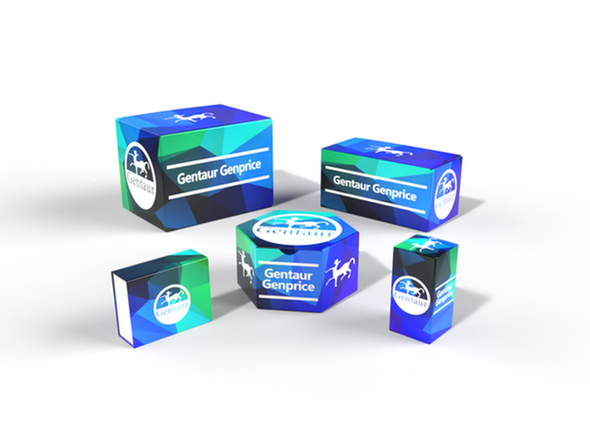740
Plant Superoxide dismutase [Cu-Zn] (SOD1) ELISA Kit | AE63259PL
- SKU:
- 740-AE63259PL
- Availability:
- Usually ships in 5 working days
Description
Plant Superoxide dismutase [Cu-Zn] (SOD1) ELISA Kit | AE63259PL | Gentaur UK, US & Europe Distribution
Species Reactivity: Plant
Abbreviation: SOD1
Alternative Name: N/A
Application: ELISA
Range: Request Information
Sensitivity: Request Information
Intra-Assay: ≤5.4%
Inter-Assay: ≤9.5%
Recovery: 0, 96
Sample Type: Serum, Plasma, Other biological fluids
Detection Method: Sandwich
Analysis Method : Quantitive
Test Principale: This assay employs a two-site sandwich ELISA to quantitate SOD1 in samples. An antibody specific for SOD1 has been pre-coated onto a microplate. Standards and samples are pipetted into the wells and anySOD1 present is bound by the immobilized antibody. After removing any unbound substances, a biotin-conjugated antibody specific for SOD1 is added to the wells. After washing, Streptavidin conjugated Horseradish Peroxidase (HRP) is added to the wells. Following a wash to remove any unbound avidin-enzyme reagent, a substrate solution is added to the wells and color develops in proportion to the amount of SOD1 bound in the initial step. The color development is stopped and the intensity of the color is measured.
Product Overview: Superoxide dismutase 1, solubleis a human protein and gene. This gene encodes one of three forms of the human superoxide dismutase. SOD1 binds copper and zinc ions and is one of three isozymes responsible for destroying free superoxide radicals in the body. The encoded isozyme is a soluble cytoplasmic and mitochondrial intermembrane space protein, acting as a homodimer to convert naturally occurring, but harmful, superoxide radicals to molecular oxygen and hydrogen peroxide. Mutations (over 100 identified to date) in this gene have been linked to familial amyotrophic lateral sclerosis. The most frequent mutation are A4V (in the U.S.A.) and H46R (Japan) . The most studied ALS mouse model is G93A. Rare transcript variants have been reported for this gene.
Stability: The stability of ELISA kit is determined by the loss rate of activity. The loss rate of this kit is less than 5% within the expiration date under appropriate storage condition. The loss rate was determined by accelerated thermal degradation test. Keep the kit at 37°C for 4 and 7 days, and compare O.D.values of the kit kept at 37°C with that of at recommended temperature. (referring from China Biological Products Standard, which was calculated by the Arrhenius equation. For ELISA kit, 4 days storage at 37°C can be considered as 6 months at 2 - 8°C, which means 7 days at 37°C equaling 12 months at 2 - 8°C) .

![Plant Superoxide dismutase [Cu-Zn] (SOD1) ELISA Kit Plant Superoxide dismutase [Cu-Zn] (SOD1) ELISA Kit](https://cdn11.bigcommerce.com/s-1rdwiq712m/images/stencil/608x608/products/85241/85680/gentaur-genprice__26005.1661610467__29809.1661628092__75433.1661676199__77988.1661684280__64362.1661692443__13863.1661888518.png?c=1)
![Plant Superoxide dismutase [Cu-Zn] (SOD1) ELISA Kit Plant Superoxide dismutase [Cu-Zn] (SOD1) ELISA Kit](https://cdn11.bigcommerce.com/s-1rdwiq712m/images/stencil/590x590/products/647934/653775/gentaur-genprice__04902.1663435466__38299.1663436130__95220.1663875382.png?c=1)
![Human Superoxide dismutase [Cu-Zn] (SOD1) ELISA kit Human Superoxide dismutase [Cu-Zn] (SOD1) ELISA kit](https://cdn11.bigcommerce.com/s-1rdwiq712m/images/stencil/590x590/products/264649/264694/gentaur-genprice__26005.1661610467__29809.1661628092__75433.1661676199__77988.1661684280__64362.1661692443__02085.1662049603__45075.1662119302__91744.1662191540__21580.1662291419__24101.1662647845.png?c=1)
ELISA Kit Horse Superoxide dismutase [Cu-Zn](SOD1)ELISA Kit](https://cdn11.bigcommerce.com/s-1rdwiq712m/images/stencil/590x590/products/276265/276472/gentaur-genprice__26005.1661610467__29809.1661628092__75433.1661676199__77988.1661684280__64362.1661692443__02085.1662049603__45075.1662119302__91744.1662191540__21580.1662291419__10556.1662657723.png?c=1)
 ELISA kit Bovine Superoxide dismutase [Cu-Zn](SOD1) ELISA kit](https://cdn11.bigcommerce.com/s-1rdwiq712m/images/stencil/590x590/products/276887/277094/gentaur-genprice__26005.1661610467__29809.1661628092__75433.1661676199__77988.1661684280__64362.1661692443__02085.1662049603__45075.1662119302__91744.1662191540__21580.1662291419__40435.1662657926.png?c=1)

![Duck Superoxide dismutase [Cu-Zn] (SOD1) ELISA Kit Duck Superoxide dismutase [Cu-Zn] (SOD1) ELISA Kit](https://cdn11.bigcommerce.com/s-1rdwiq712m/images/stencil/590x590/products/86105/86544/gentaur-genprice__26005.1661610467__29809.1661628092__75433.1661676199__77988.1661684280__64362.1661692443__66702.1661889123.png?c=1)
![Hamster Superoxide dismutase [Cu-Zn] (SOD1) ELISA Kit Hamster Superoxide dismutase [Cu-Zn] (SOD1) ELISA Kit](https://cdn11.bigcommerce.com/s-1rdwiq712m/images/stencil/590x590/products/86528/86967/gentaur-genprice__26005.1661610467__29809.1661628092__75433.1661676199__77988.1661684280__64362.1661692443__42344.1661889413.png?c=1)
![Human SOD1 (Superoxide dismutase [Cu-Zn]) ELISA Kit Human SOD1 (Superoxide dismutase [Cu-Zn]) ELISA Kit](https://cdn11.bigcommerce.com/s-1rdwiq712m/images/stencil/590x590/products/426102/430931/gentaur-genprice__26005.1661610467__29809.1661628092__75433.1661676199__77988.1661684280__64362.1661692443__02085.1662049603__45075.1662119302__91744.1662191540__21580.1662291419__89175.1663070601.png?c=1)
![Mouse SOD1 (Superoxide Dismutase [Cu-Zn]) ELISA Kit Mouse SOD1 (Superoxide Dismutase [Cu-Zn]) ELISA Kit](https://cdn11.bigcommerce.com/s-1rdwiq712m/images/stencil/590x590/products/428793/433622/gentaur-genprice__26005.1661610467__29809.1661628092__75433.1661676199__77988.1661684280__64362.1661692443__02085.1662049603__45075.1662119302__91744.1662191540__21580.1662291419__05188.1663071041.png?c=1)